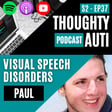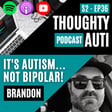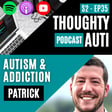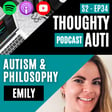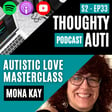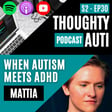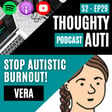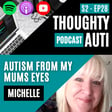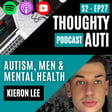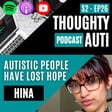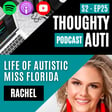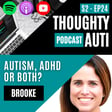
Diversity In Autism - The Many Facets Of Neurodiversity w/Holistic Autistic
This episode dives into many different popular topics of diversity:- Extroversion/Introversion, co-morbidities, special interests/innate abilities, sensory profiles, and empathy!
In this episode of the Thoughty Auti Podcast, Thomas Henley talks to Jesslyn from the Holistic Autistic YouTube channel - she has a community-focussed website which aids in the education of Neurodiversity, and provides a platform for self-diagnosed and late-diagnosed autistic people to connect together. With the creation of her NEW book 'I Think I'm Autistic' Jess strives to improve the accessibility of autism-related info to teenagers and adults.
In a bid to understand the mainstream confusion around CBD, Thomas and Stacey get things started by talking about the many CBD products available in the UK market. With products ranging (but not limited to)CBD pillowcases, CBD vape pens, CBD energy drinks, CBD capsules, CBD skin cream and CBD oil drops...
The introversion:extroversion concept is riddled with misconception, and at this time it's difficult to put autistic people into either category. Self-regulation and sensory aspects make most inclined to the introverted existence, but many flourish in social situations in the right mental state.
With little research it's hard to pinpoint the environmental and biological significance in the development of cooccurring conditions. Why do these conditions get diagnosed before autism? The better question is... is there anything that isn't co-morbid with autism?
Special interests, although patronising in classification, differ more greatly in between each individual than most could theorise. In general, innate abilities differ vastly from person to person, and there is massive variety between the God-given skills of people on the spectrum. Autistic people even have a few remarkably interesting social skills of their own.
Sensory profiles and differences, although well documented, prove to boggle even the most experienced Aspie-Nauts. Hypo, hyper, seeking and avoiding. It sounds simple, but there are many nuisances we fail to pinpoint!
Have you ever taken a sociopath test? Theory Of Mind and popular belief has caused many to question whether autistic people feel empathy! Can autistic people be empathetic, and what significance do Cross-Cognitive Differences hold?
If you have an exciting or interesting story and want to appear on the next podcast, please contact me at: aspergersgrowth@gmail.com
Jess' Links:-
Instagram - https://www.instagram.com/holisticautistic/
YouTube - https://www.youtube.com/c/HolisticAutistic
Website - https://holisticautistic.weebly.com/#/
▬▬▬▬▬▬▬▬▬▬▬▬▬▬▬▬▬▬▬▬▬▬▬▬▬▬▬▬▬
Support via Patreon! - https://www.patreon.com/aspergersgrowth
Social Media ♥
☼ Facebook - Aspergers Growth
☼ Twitter/Instagram - @aspergersgrowth
♫ Track: [Chill Music] Ikson - Reverie [No Copyright Music]






